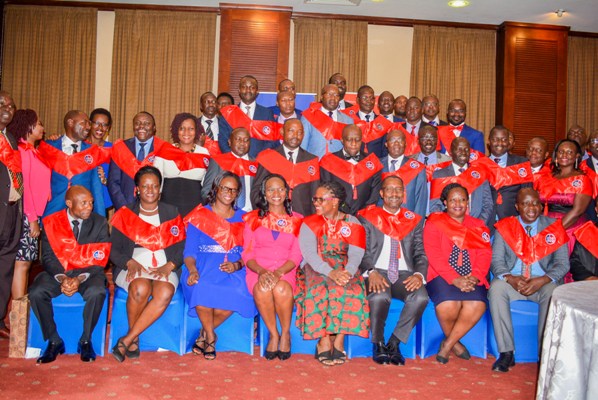In a move aimed at improving competitiveness of its employees, the National Social Security Fund (NSSF) has enlisted the expertise of the prestigious Strathmore Business School.
Speaking during a graduation ceremony of 62 of its staff from the institution recently, Richard Byarugaba, the Managing Director at NSSF noted that continuously equipping staff with the skills necessary to meet the growing demands of the sector creates value for the savers while ensuring improved service delivery.
“At NSSF, we have a deliberate strategy to equip our staff with competencies not only in managing systems but also in critical management and leadership skills. This is a crucial step in strengthening our organizational culture and is ultimately instrumental in driving the economic success of the Fund,” he explained.
The Fund’s staff development strategy includes Training & Development in critical management and leadership skills and Talent Management for ensuring a healthy talent pipeline and adequate resource cover in addition to ensuring competent successors.
This year’s NSSF graduands from the Strathmore Business School undertook the Executive Leadership Program and the Senior Managers’ Leadership Program. The Executive Leadership Program offers a comprehensive transformational learning experience that prepares the most senior executives at the Fund to assume responsibilities at the highest level as they lead to achieve sustainable competitive advantage.
The Senior Manager’s Leadership Program on the other hand is for mid-level managers and professionals who want to broaden their knowledge and competencies in critical management and leadership skills. The intense interactive learning experience allows the executives to step back from their day-to-day responsibilities, reassess their views on the current business environment, refine their judgment and enhance their motivational skills.
Byarugaba underscored the importance of varying managerial actions and attitudes explaining that these ultimately denote the difference between success and failure.
“African institutions are faced with several challenges most of which tend to be associated with gaps in leadership and people management. Our underlying aim for enlisting onto Strathmore Business School’s programs was to realize a high performance organization, improve communication skills while at the same time embedding a coaching culture in the institution,” he stated.
In his remarks, Dr. George Njenga, the Dean at Strathmore Business School emphasized the need to nurture leaders who will make wise decisions that balance short-term considerations with the achievement of long-term objectives.
He further explained that the bewildering rate of change and new ethical and governance challenges have heightened the demand for great ethical leaders with a passion for excellence.
“In the current globalized economy, our programs such as that with NSSF are meant to foster a culture of continuous learning and dynamism through bridging local and international knowledge resources,” he said.
He added: “Business paradigms and benchmarks are continuously changing and business leaders need to incessantly revise their assumptions, ideas and beliefs. For instance, Strathmore Business School strongly believes that ethical and family-friendly values do not detract from the bottom-line of companies, but do in fact enhance profitability, in addition to employee and customer loyalty. Similarly, we believe that corporate social responsibility activities aligned to the organization’s strategy, can have a positive impact on its bottom-line.”
NSSF has also implemented other learning and development strategies for its staff that include the award winning online platform dubbed “Desire to Learn”.
The system enables staff to access world class training, including prestigious Harvard managerial courses. The Fund also offers staff certifications in professional courses, talent management and succession planning training.





